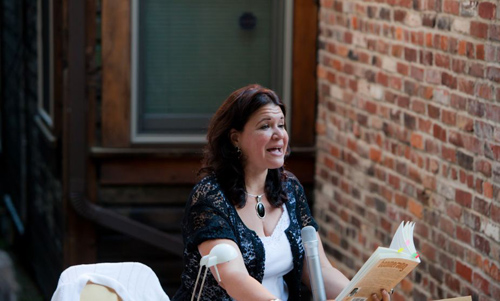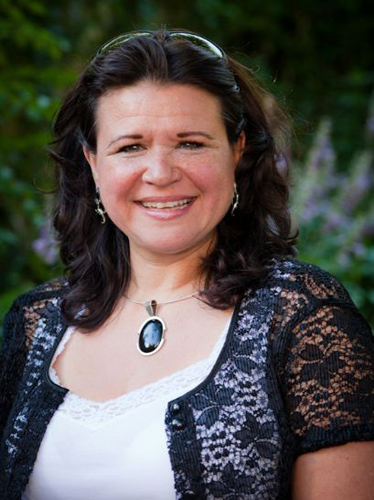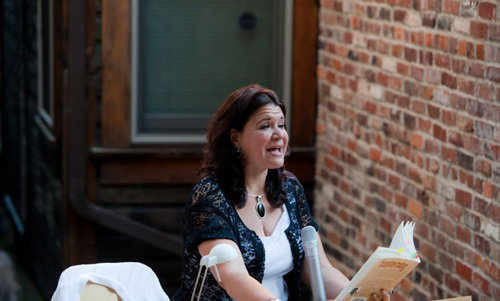Brenda Cárdenas: “Purity is an illusion”
by Silvia Duarte / August 18, 2010 / No comments

Brenda Cárdenas reading outside of House Poem on Sampsonia Way, Photo © Renee Rosensteel
The first week of July, poet Brenda Cárdenas visited Sampsonia Way to give a reading with Francisco Aragón. The event was sponsored by City of Asylum/Pittsburgh in partnership with Cave Canem and Letras Latinas.
A native of Milwaukee, Wisconsin, Cárdenas is the author of two poetry collections, From the Tongues of Brick and Stone (Momotombo Press) and Boomerang (Bilingual Press). She is also the co-editor of Between the Heart and the Land / Entre el Corazón y la Tierra: Latina Poets in the Midwest and a professor of English at the University of Wisconsin-Milwaukee.
Rather than clinging to what she calls the “illusion” of a “pure culture,” Cárdenas writes in a blend of English and Spanish as a way to celebrate the cultural hybridity of her heritage.
You are the daughter of immigrants. Where were your parents from?
My dad is Mexican and my mother is German. My father’s parents came in the twenties. My grandfather had a brother who was already in Milwaukee and, eventually, many relatives made the journey there. My grandfather and his brother married my grandmother and her sister and all the family came to the United States. I grew up around all my father’s nuclear and extended family, including his cousins, who I called tío and tía (uncle and aunt). That is why I think I retained so much of the culture and the language.
Your poem “When We Moved Away from Tía Elia’s and Uncle Karel’s, 1968” illustrates how you grew up in an environment infused with multiple cultures and, and, above all, the hybrid language in which you write.
The poem presents my memories of my Aunt Elia —daughter of Mexicans— and her husband Karel —first generation immigrant from Yugoslavia. My father and his sister got married on the same day and they all moved into the same house. So there were all these languages being spoken in my house: there was my uncle who was learning English but spoke Slovenian, and there was my father’s and my aunt’s Spanish and English. All the in–laws in my family who were not Mexican learned some Spanish, even the Yugoslavian guy. In that poem he is the one who named me ‘cacahuate mantequilla’ (peanut butter).
After reading your poems, it seems like the mix of English and Spanish you use is not a translation or a combination, but a language in its own right.
Some people will say that this mix is a language. Rosaura Sánchez, the Chicana linguist who wrote Chicano Discourse, looks at conversations that go from Spanish to English or de Inglès a Español. She explains how this discourse makes use of its own invented words and how speakers switch from one code to another at certain places in their sentences, which leads to a completely different language. I think that if this mix is not a language, it’s at least a dialect. It’s very natural for some people and reflects their retention of their latinidad (Latinity).
As a child I heard all this mixing of languages and I mixed them in my mind. But each immigrant’s case is different. In some cases where the adults of the families are the first generation of immigrants, the kids might speak one language in school and another at home, and the languages don’t mix. It depends also on the region of the country where the immigrants are living. Gloria Anzaldúa writes about that in Borderlands: La Frontera. She writes about all these different registers—pachuco Spanish, calò, chicano Spanish, Tex Mex, etc. But here Anzaldúa is also not writing about immigrants but, rather, about Chicanos/as, and they did not immigrate to the U. S.; instead, the border crossed them after the Mexican-American War.
This explains why you defend your poetry as inter-lingual instead of bilingual.
When I think of the word bilingual, I think of that as meaning two languages —you take a poem and you translate it into another language. I do that, but it’s not what I do most often. Most of my poems combine both languages and I use the words inter-lingual or trans-lingual to describe them. It’s a switching back and forth between codes. It’s a weaving.
You also have some whole poems in Spanish. How do you choose which language to write in?
Sometimes I write poems in Spanish and translate them, but sometimes I write very sonic poems that incorporate a lot of language play in Spanish only. If I translate those into English, they lose all of the meaning; all of the nuances and humor are lost.
You have an amazing flexibility and often cross borders. Your scholarly background is interdisciplinary; your poems are inter-lingual; and you write free verse, prose poems, Sapphics, and sonnets…
I’m interested in liminal spaces, in the spaces in between. That interest comes from often feeling like a crossroads–like I have one foot in one world and the other in another world, as do many other transcultural people. If you have been living in the United States for a while and you go to Mexico you are not Mexican enough for the Mexicans (they used to call you pocho). And in the United States you are certainly not American enough, or privileged enough or white enough.
Do you still feel like you have one foot in Mexican culture and one foot in the culture of the United States?
When I was younger I felt that more; I felt as if I didn’t fit anywhere. But as I grew up, I started to look more at the syncretic or interstitial spaces, and I wanted my work to celebrate those spaces. When I do readings, Latino teenagers come up to me and say, “Wow, I didn’t know you could mix these words in this way.” Yes, you can! Language is always changing. Change is part of life. If the molecules and atoms that make up your skin change everyday, why would language be any different?
Does your poetry take a political stance when it illustrates the influence of Spanish language and culture in the United States?
That is the other thing that attracts me to those liminal spaces. It’s not just that the English takes over the Spanish; it goes both ways. I’m not against somebody who says, “I want to keep my language as pure as I can.” But I really don’t believe there is a pure anything. It’s not a pure race, it’s not a pure culture, it’s not a pure language.
Was it challenging to publish your work because it’s inter-lingual?
It’s very hard to publish an inter-lingual book. I sent it to many first book contests and it didn’t win anything. Perhaps the poems or the book were not as strong as others that won those contests, but I can’t help but wonder if the mixing of languages and my refusal to italicize the Spanish might not have had a bearing on how long it took me to publish the book.
Did any publishing houses ask you to italicize the Spanish?
No, no publisher asked me to do that, but I know this makes it even harder for the monolingual English readers, because they are used to seeing foreign word italicized. But for me this is not a foreign language—not any more foreign than English is to the Americas.
Do you face criticism because your work is inter-lingual and “messes” with language?
When I was named the poet laureate of Milwaukee earlier this year, the newspaper announced it and said that I liked to blend languages. There was a man who wrote an email to all the editors and copied it to me. He said my work was an abomination. He said “the students cannot pass in school because they don’t have the proper English and now Brenda is being held up as a model…” He was really patronizing and racist and I didn’t respond. The problem is that he probably represents a lot of people out there: Arizona, hello.
Letras Latinas, the literary program at the Institute for Latino Studies at the University of Notre Dame, seeks to enhance the visibility of Latino writers. Why are institutions like this needed in the United States?
Because they refuse to believe that Latinos should be silent about their cultures, about the linguistic terrorism they confront, and all the ways in which Latinos are still not treated equally in this country. And because they also celebrate the huge diversity that exists in Latino/a literature both in terms of the writers’ cultural backgrounds and the various styles they write in and subjects they write about. The United States’ literary world would have ignored Latino writing and kept it always in the margins without the help of institutions like Letras Latinas and presses like Bilingual Review Press or Arte Publico Press.
Do Latino poets face a pressure to write about so-called “Latino issues?”
Some people are looking for some latinidad to surface in your work and, if they don’t find it, they might feel frustrated. But I really believe that that’s changing a lot. Now we have a real diversity among the Latino writers: those who write fully in English, others who use a kind of Spanish syntax beneath their English or who translate modismos (idioms) in a literal way to create nuances beneath the surface of their poems—nuances that will be understood best by the bilingual reader. There are also some Latino/a poets who are not interested in exploring issues of cultural identity and more interested in other matters of being. Some refuse to use the expected iconography in their work. After all, to decide what is Latino can lead to problematic stereotyping
How are Latino writers responding to the Arizona law?
I think that it’s too soon to see many poems published on this issue yet, but I’m sure we are going to see them. The idea that families will be separated and I could be arrested for giving a ride to an undocumented immigrant—it’s just insane. And they also passed the law to ban ethnic studies, which is going to have a huge effect on the literary and cultural studies that scholars are undertaking and teaching. It’s so silly: If a school is offering an American Literature course, it better include some Latino, Asian-American, Native American, and African-American writers at least. If not, the course will not be representing United States literature; it would be so full of gaps, it would be a lie.
Read Sivlia’s bio.






